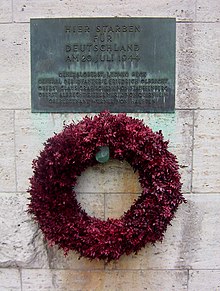
Back المقاومة الألمانية للنازية Arabic Германска съпротива срещу нацизма Bulgarian Německý odboj během druhé světové války Czech Oppositionen i Nazityskland Danish Germana kontraŭnazia rezistado Esperanto Resistencia alemana al nazismo Spanish Vastupanuliikumine Estonian مقاومت آلمان Persian Résistance intérieure au nazisme French התנגדות גרמנית לנאציזם HE

| Part of a series on |
| Anti-fascism |
|---|
 |
The German resistance to Nazism (German: Widerstand gegen den Nationalsozialismus) included unarmed and armed opposition and disobedience to the Nazi regime by various movements, groups and individuals by various means, from attempts to assassinate Adolf Hitler or to overthrow his regime, defection to the enemies of the Third Reich and sabotage against the German Army and the apparatus of repression and attempts to organize armed struggle, to open protests, rescue of persecuted persons, dissidence and "everyday resistance".[1][2]


German resistance was not recognized as a united resistance movement during the height of Nazi Germany, unlike the more organised efforts in other countries, such as Italy, Denmark, the Soviet Union, Poland, Greece, Yugoslavia, France, the Netherlands, Czechoslovakia, and Norway.[3] The German resistance consisted of small, isolated groups that were unable to mobilize mass political opposition.[4] Individual attacks on Nazi authority, sabotage, and the disclosure of information regarding Nazi armaments factories to the Allies, as by the Austrian resistance group led by Heinrich Maier, occurred. One strategy was to persuade leaders of the Wehrmacht to stage a coup d'état against the regime; the 20 July plot of 1944 against Hitler was intended to trigger such a coup.[3] Hundreds of thousands of Germans had deserted from the Wehrmacht, many defected to the Allies or the anti-Fascist resistance forces,[1] and after 1943, the Soviet Union made attempts to launch a guerrilla warfare in Germany with such defectors and allowed the members of the National Committee for a Free Germany which consisted mostly of the German prisoners of war to be engaged in the military operations of the Red Army and form small military units.[5][6]
It has been estimated that during the course of World War II 800,000 Germans were arrested by the Gestapo for resistance activities. It has also been estimated that between 15,000 and 77,000 of the Germans were executed by the Nazis.[1] Resistance members were usually tried, mostly in show trials, by Sondergerichte (Special Courts), courts-martial, People's Courts, and the civil justice system. Many of the Germans had served in government, the military, or in civil positions, which enabled them to engage in subversion and conspiracy. The Canadian historian Peter Hoffmann counts unspecified "tens of thousands" in Nazi concentration camps who were either suspected of or engaged in opposition.[7] The German historian Hans Mommsen wrote that resistance in Germany was "resistance without the people" and that the number of those Germans engaged in resistance to the Nazi regime was very small.[8] The resistance in Germany included members of the Polish minority who formed resistance groups like Olimp.[9]
- ^ a b c Cite error: The named reference
Continuumwas invoked but never defined (see the help page). - ^ Gill, Anton (1995). An Honourable Defeat: A History of German Resistance to Hitler, 1933–1945. New York: H. Holt. ISBN 0-8050-3515-X.
- ^ a b Klemperer, Klemens von (1992). German Resistance Against Hitler: The Search for Allies Abroad 1938–1945. Oxford University Press. pp. 4–5. ISBN 978-0191606793.
- ^ Goldhagen, Daniel Jonah (2010). Hitler's willing executioners: ordinary Germans and the Holocaust. Vintage eBooks. ISBN 978-0-307-42623-9. OCLC 681527358.
- ^ Cite error: The named reference
fd1was invoked but never defined (see the help page). - ^ Cite error: The named reference
epwas invoked but never defined (see the help page). - ^ Peter Hoffmann "The History of the German Resistance, 1933–1945" p. xiii
- ^ Mommsen, Hans "German Society and the Resistance Against Hitler" pp. 255–73 from The Third Reich The Essential Readings edited by Christian Leitz, Blackwell: London, 1999 pp. 259–62.
- ^ Maciejewska, Beata (5 June 2007), "Hołd dla polskich patriotów z Breslau", Gazeta Wroclaw, retrieved 14 July 2010